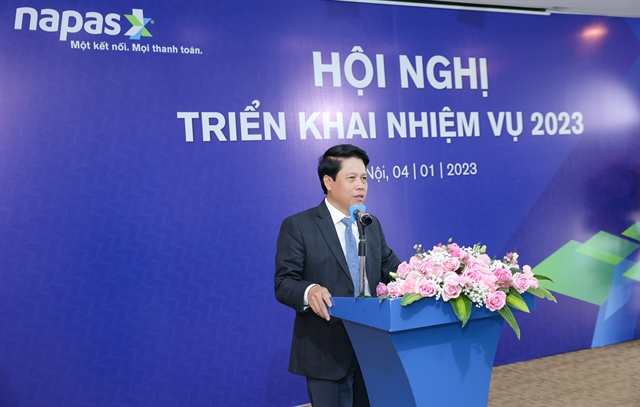 Economy
Economy


|
| Deputy Governor of State Bank of Việt Nam Phạm Tiến Dũng delivered a speech at the conference. — Photo courtesy of NAPAS |
HÀ NỘI — The number of non-cash payment transactions through the National Payment Corporation of Việt Nam (NAPAS) nearly doubled in 2022 compared to the previous year.
Nguyễn Quang Minh, NAPAS’ General Director, made the statement at a conference held in Hà Nội on Wednesday.
“In 2022, NAPAS has completed the key tasks assigned by the State Bank of Vietnam and closely followed the non-cash payment development plan for the 2021-25 period. It has promoted its role as a supplier of the national payment infrastructure, financial switching services, supporting banks, financial companies, payment intermediaries and partners to develop a digital payment ecosystem while increasing convenience and payment experience for all people.”
Minh also said the proportion of cash withdrawals in total transactions processed through the NAPAS system decreased from 12 per cent in 2021 to 6.56 per cent in 2022.
In terms of ensuring safe, stable and smooth operating infrastructure in 2022, the service-level agreement (SLA) for ATM/POS switching services; online card payment and NAPAS 247 Quick Transfer service reached nearly 100 per cent.
NAPAS has always been ready in terms of systems and resources and developed plans to ensure the safety of important information systems. At the same time, it has expanded its processing capacity to meet the demand for large transaction volume growth during peak times of the year.
The proportion of chip card transactions made through the NAPAS system increased from 26 per cent in 2021 to more than 60 per cent in 2022.
The NAPAS 247 Quick Transfer service with VietQR code also had impressive growth after more than a year since launch.
NAPAS completed the project of interconnecting NAPAS 247 Quick Transfer service with Mobile Money accounts at VNPT and Viettel; expanding the form of payment by VietQR code on the national public service portal with 17 banks. It has also implemented projects to strengthen international connections between card organisations and switching companies of Thailand, South Korea, Cambodia, and Russia.
In addition, NAPAS has expanded the payment ecosystem and increased convenience for users by promoting cooperation with banks and financial companies participating in domestic credit card issuance as well as Vinbus payment service to customers of 18 banks.
It has implemented many programmes to support its members in 2022 such as completing the conversion of chip cards according to the basic standards of the central bank’s domestic chip cards.
NAPAS reduced fees for member organisations under the exemption and reduction of switching service programme of up to VNĐ1.7 trillion (nearly US$73 million).
Speaking at the conference, Deputy Governor of State Bank of Vietnam Phạm Tiến Dũng said the continued reduction in the proportion of cash withdrawal transactions compared to the total transactions and the increase in the proportion of Việt Nam Chip Card Standard (VCCS) – domestic chip card standards processed through the NAPAS system in 2022 showed a development in NAPAS’ operation. This also showed that banks are also gradually shifting to VCCS chip cards.
In addition, promoting payment implementation for seven public service groups on the National Public Service Portal and strengthening international payment connections with some countries are also a bright spot in NAPAS' activities in 2022, he added.
Nguyễn Quang Hưng, Chairman of the Board of Directors of NAPAS, said they would actively and closely co-ordinate with banks, payment intermediaries, domestic and international partners to build and developing a multi-service digital payment ecosystem, contributing to promoting the non-cash payment, comprehensive financial universalisation towards the goal of building a digital economy and digital nation. — VNS




